Mobile App Development and Web Development offer great career opportunities in today’s tech world. However, these two fields require different skills and knowledge. If you’re thinking about changing careers, learning something new, or just curious, knowing the differences.
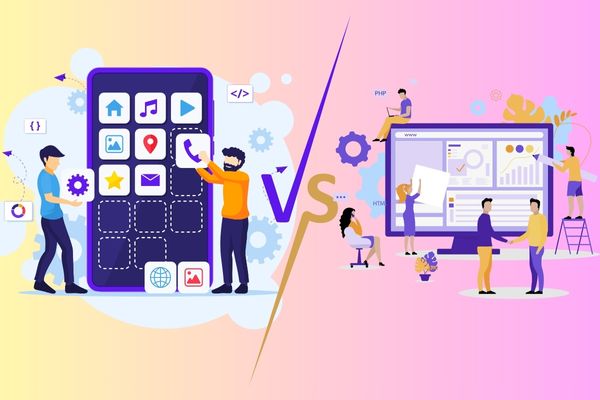
Understanding Mobile App Development vs Web Development can help you choose the right path. In this blog, we’ll look at both areas to help you decide which suits your interests and goals.
What is Mobile App Development?
Mobile App Development involves creating software applications for smartphones and tablets. These apps are designed to utilize the unique features of mobile devices, such as touchscreens, cameras, and GPS, providing a personalized and user-friendly experience.
Skills required
Here’s a list of key skills required for mobile app development:
1. Programming Languages
- Android: Java, Kotlin
- iOS: Swift, Objective-C These languages are essential for writing the code that powers your app.
2. Cross-Platform Development
- Frameworks like React Native or Flutter allow you to build apps for both Android and iOS using a single codebase, saving time and effort.
3. UI/UX Design

- Understanding how to design apps that are easy to use, intuitive, and visually appealing is critical for good user experience.
4. App Testing and Debugging
- Testing your app on multiple devices is necessary to find bugs, improve performance, and ensure the app works correctly for all users.
5. Backend Knowledge
- Familiarity with APIs, databases, and server-side development is useful for creating apps that interact with the backend (data storage, authentication, etc.).
6. Version Control
- Tools like Git help manage and track code changes, especially when working with teams.
7. Problem-Solving Skills
- Mobile developers need to troubleshoot bugs, optimize performance, and come up with creative solutions to problems during development.
8. Attention to Detail
- Small mistakes can cause significant issues in mobile apps. Ensuring precision in every element of your app is vital for smooth functionality.
9. Device Features Integration
- Mobile apps often integrate with hardware features like the camera, GPS, accelerometer, etc. Understanding how to work with these devices is important for enhancing app functionality.
10. Staying Updated
- The mobile development field is fast-changing. Keeping up with new tools, programming languages, and trends is essential for staying competitive.
Our Key Responsibilities
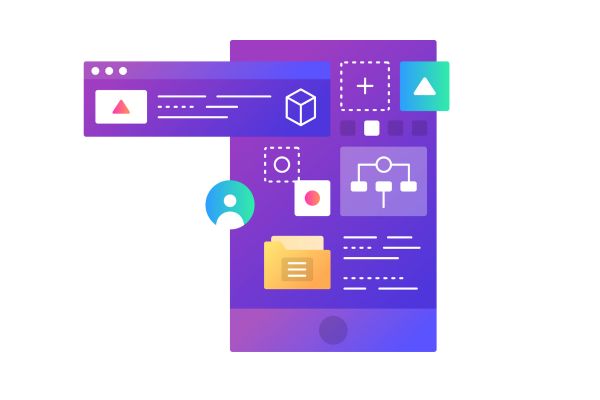
- Designing and Developing Apps : We create simple, engaging apps that meet users’ needs.
- Cross-Platform Optimization : Ensuring apps function smoothly across Android and iOS platforms.
- User Experience (UX) : We prioritize seamless and easy-to-use interfaces, collaborating with designers for the best results.
- Maintenance and Updates : After launch, we provide regular updates, bug fixes, and performance improvements.
Advanced Tools We Use
- React Native / Flutter : For cross-platform development, saving time and resources by using one codebase for both Android and iOS.
- Swift / Kotlin : Native programming languages for building high-performance apps tailored for iOS and Android.
- Xcode / Android Studio : Development environments for building, testing, and debugging apps.
- Firebase : For real-time database management, authentication, and analytics.
What is Web Development?
Web Development is creating websites and web applications that people access through a web browser on various devices like desktops, laptops, tablets, and smartphones.
Skills required
Here’s a simple list of key skills required for web development:
1. HTML (HyperText Markup Language)
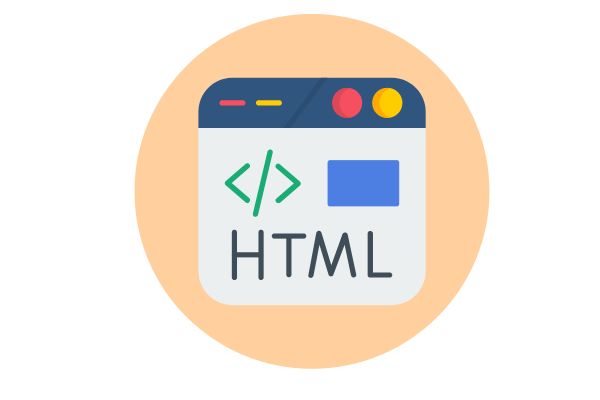
- HTML is the foundation of every web page. It defines the structure of web content (headings, paragraphs, images, links, etc.).
2. CSS (Cascading Style Sheets)
- CSS is used to style and design a website, controlling its layout, colors, fonts, and overall appearance to make it visually appealing.
3. JavaScript
- JavaScript makes websites interactive. It enables features like forms, pop-ups, animations, and dynamic content updates without reloading the page.
4. Responsive Design
- Websites should look good on any device (desktop, tablet, or mobile). Knowing how to create designs that adapt to different screen sizes is essential.
5. Version Control (Git)
- Git allows developers to track changes in code, collaborate with others, and manage different versions of the website or web application.
6. Front-End Frameworks
- React, Vue.js, and Angular are popular front-end frameworks that help build fast, interactive user interfaces efficiently.
7. Back-End Development
- Node.js, PHP, Python, and Ruby are common back-end technologies used to build the server-side of web applications, handle databases, and manage data.
8. Databases
- Understanding how to work with databases like MySQL, MongoDB, or PostgreSQL is essential for storing and retrieving data in dynamic websites and apps.
9. APIs (Application Programming Interfaces)
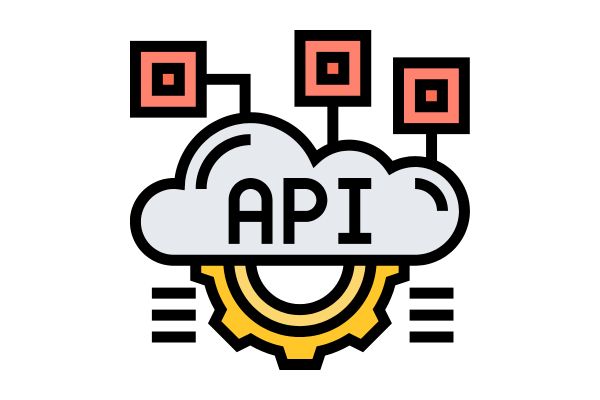
- APIs allow websites to communicate with other services (e.g., payment gateways, social media logins). Understanding how to use and integrate APIs is crucial.
10. Web Security
- Securing a website is vital. Developers need to understand encryption, authentication, and protection from common security threats (e.g., SQL injection, cross-site scripting).
11. SEO (Search Engine Optimization)
- SEO helps ensure your website is visible and ranks well on search engines like Google. Understanding basic SEO principles helps improve site traffic.
12. Testing and Debugging
- Testing ensures your website works correctly. It involves checking for bugs and ensuring that everything functions properly across browsers and devices.
13. Web Performance Optimization
- A website should load quickly. Optimizing images, using caching, and writing clean code can improve loading speed and overall performance.
14. Collaboration and Communication
- Web developers often work in teams, so communication skills and the ability to collaborate with designers, project managers, and other developers are important.
15. Continuous Learning
- The web development field is constantly evolving, so staying updated with new tools, technologies, and trends is crucial for success.
Our Key Responsibilities
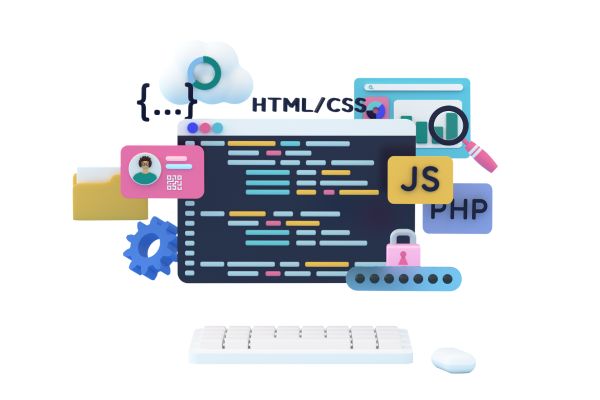
- Website Development : We create visually appealing websites that are fast and functional on all devices.
- Back-End Development : We work on server-side technologies to manage databases, APIs, and server logic that power websites.
- Front-End Development : Designing the user-facing portion of websites, ensuring they are responsive and work on different screen sizes.
- Testing and Optimization : We ensure the website is secure, fast, and provides a smooth user experience.
Advanced Tools We Use
- HTML / CSS / JavaScript : Core technologies for front-end development.
- React / Angular / Vue.js : JavaScript frameworks for building dynamic, interactive web pages.
- Node.js / PHP / Python : Server-side programming languages for handling databases and server logic.
- MySQL / MongoDB : Databases used for storing and retrieving data.
- Git : Version control for managing code changes.
- SEO Tools : Tools to optimize the website for search engines and improve visibility.
Key Differences
Both fields share some similarities but if you wanna know about mobile app development vs web development you have to learn about the key differences:
1. Platform
- Mobile App Development : Focuses on building apps for smartphones and tablets installed directly on devices.
- Web Development : Involves creating websites that run in web browsers and are accessible via any internet-enabled device.
2. Technologies Used
- Mobile App Development : Uses platform-specific languages like Java, Kotlin, and Swift or cross-platform tools like React Native and Flutter.
- Web Development : Primarily uses HTML, CSS, JavaScript, and server-side languages like PHP, Node.js, and Python.
3. User Experience

- Mobile App Development : Focuses on optimizing apps for mobile interfaces touchscreens, and integrating device features like cameras and GPS.
- Web Development : Ensures websites are responsive, visually appealing, and user-friendly across devices, with attention to website speed and SEO.
4. Access
- Mobile Apps : Require installation on the user’s device and can often be used offline after downloading.
- Websites : Accessible through browsers with an internet connection, without installation.
5. Maintenance and Updates
- Mobile Apps : Need regular updates via app stores; users must download the latest version.
- Websites : Updates happen directly on the server, and users automatically see the latest version.
Why Hire Our Services for Mobile App and Web Development?
No matter if you need a mobile app or a website, we bring years of experience and expertise to help you succeed. Here’s why you should consider hiring our services:

1. Expertise Across Platforms
We are skilled in mobile app and web development, offering you a one-stop solution for all your digital needs. No matter if Android, iOS, or responsive websites, we’ve got you covered.
2. User-Centered Design
Our development process focuses on creating intuitive, user-friendly designs. We collaborate closely with you to ensure your product meets your customers’ needs and expectations.
3. Cutting-Edge Tools
We use the latest technologies and development tools to deliver high-performance, scalable, secure apps and websites.
4. Timely Delivery
We understand the importance of deadlines and work efficiently to ensure your project is completed on time without compromising quality.
5. Ongoing Support and Maintenance
Our services don’t end after launch. We offer continuous support, updates, and performance enhancements to keep your app or website running smoothly.
6. Cost-Effective Solutions
We strive to provide the best value using efficient tools and frameworks, offering affordable, high-quality solutions.
Discover more : Shopify Website Design Services | Design Your Dream Store
FAQs | Mobile App Development vs Web Development
Q.1 What is web development?
Web development is the process of creating and maintaining websites and web applications. It involves designing, coding, and updating the structure, layout, functionality, and performance of websites.
Q.2 What are the different types of web development?
- Front-End Development: Focuses on the visual part of the website (what users see and interact with). It uses technologies like HTML, CSS, and JavaScript.
- Back-End Development: Deals with the server-side, databases, and application logic. It uses programming languages like Node.js, PHP, and Python.
- Full-Stack Development: A combination of both front-end and back-end development.
Q.3 What skills are required for web development?
Key skills include knowledge of HTML, CSS, JavaScript, version control (Git), databases (MySQL, MongoDB), back-end programming languages (Node.js, Python, PHP), responsive design, and web security practices.
Q.4 What tools do web developers use?
Web developers use tools like text editors (VS Code, Sublime Text), version control systems (Git), front-end frameworks (React, Angular), back-end frameworks (Express.js, Django), and databases (MySQL, MongoDB).
Q.5 How long does it take to become a web developer?
The time it takes to become proficient in web development depends on your background and learning path. On average, it may take anywhere from 6 months to 2 years of consistent study and practice.
Q.6 What is responsive web design?
Responsive web design ensures that websites look good and function well on all screen sizes, whether it’s a desktop, tablet, or mobile phone. This is achieved by using flexible layouts and media queries in CSS.
Conclusion | Mobile App Development vs Web Development
Choosing between Mobile App Development vs Web Development depends on your personal interests and career goals. Both exciting careers with challenges and rewards.
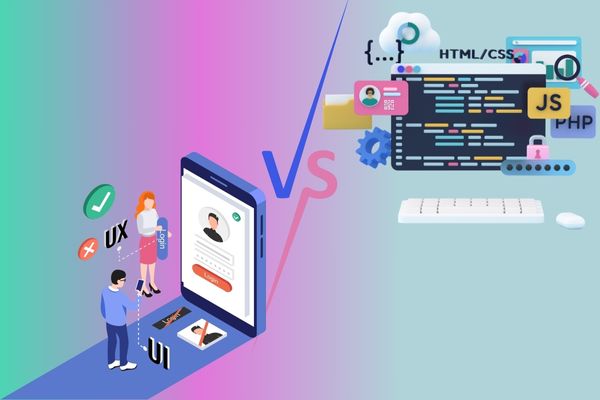
Mobile development focuses on creating phone apps, while web development is about building websites that work on any device. The right choice depends on your interests and skills. If you need more clarification, trying both through courses or small projects can help you decide.
If you need help with mobile app or web development, contact us! We’re here to create solutions that meet your goals. Let’s get started!
Also read : Freelance Web developer | Your Online Success Starts Here
